FREE MONEY
UK Treasury to end oversight of £425m scheme to help banks after RBS bailout
Kalyeena Makortoff Banking correspondent
Thu, 28 December 2023
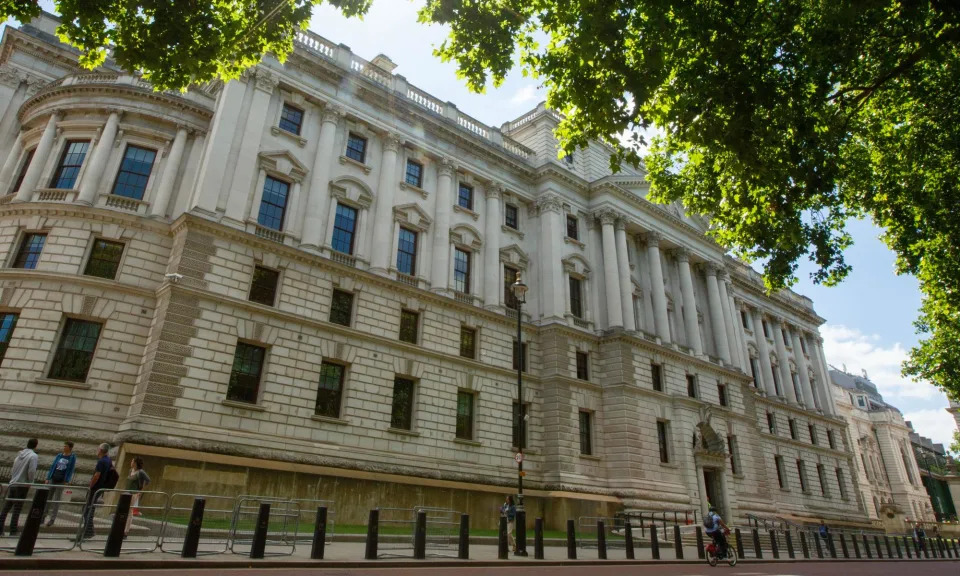
Photograph: Bloomberg/Getty Images
Lenders that received payouts from a £425m pot of public cash set aside after Royal Bank of Scotland was bailed out in 2008 will not be held accountable over delayed projects, after the Treasury refused to extend supervision arrangements beyond the new year.
Under so-called state aid rules, which applied when the UK was still a member of the European Union, RBS money was given to smaller challenger banks to spend developing their services for business customers, in an effort to promote competition and offset the market-skewing effects of RBS’s £45bn government bailout in 2008.
But the Banking Competition Remedies (BCR) body, which distributed funds and monitors how they are spent, is set to be wound down in February. Data published by the BCR reveals that, of the 24 recipients of the funds, 15 have “deliverables outstanding”, meaning they have yet to deliver the projects they were paid for.
In a public warning issued months before its planned liquidation, the BCR said: “No alternative reporting mechanism has been put in place for those awardees with outstanding deliverables and, therefore, they will be responsible for holding themselves to account and updating on their public commitments.”
It will leave no one to oversee the way lenders including Metro Bank, Virgin Money, the Cooperative Bank and specialist lenders like Atom Bank deliver their delayed projects, and spend any remaining funds.
Metro Bank, which was controversially awarded the largest prize of £120m in 2019 despite a major accounting scandal months earlier, has so far opened only four of the seven branches it promised by the end of 2023. The lender, which ended up handing back £50m of its funds a year later, was also 4,000-shy of the 206,000 business current account customers it hoped to gain by year-end. A Metro Bank spokesperson said the bank had made “good progress” and was confident in reaching store opening and account volume goals by 2025.
Meanwhile, the Co-operative Bank had only managed to cut its 15-day account opening process to seven days, leaving a “notable gap” in meeting its five-day target. It has also only managed to secure 1.8% of the UK SME market, versus targets for 2.1%.
Virgin Money is also tracking behind its near-term customer targets, the BCR said, without giving exact figures. The bank said it had achieved six of eight commitments and expected to achieve remaining targets by the agreed 2025 target date.
While the BCR asked ministers to extended its term until at least the end of 2024, that request was ultimately denied by the Treasury earlier this year, without any alternative monitoring system being put in place.
No public explanation has been given for refusing the request from BCR, which has had its operating costs – £15m to date – covered by RBS, now known as NatWest Group.
There are also no penalties for missing targets, and the BCR, with its dwindling powers, has only been able to recommended that lenders publish updates on their websites.
While the 15 lenders reached a number of their respective targets, many remain unfulfilled. They have blamed a range of factors, including the impact that the UK’s economic slowdown had on borrowing by businesses, as well as the tighter labour market, which made it harder to find competent staff for their new or expanded services.
The Treasury said: “The successful implementation of the Alternative Remedies Package (ARP) resolved a key legacy issue for NatWest, facilitating further sales of the government’s shareholding whilst benefitting the SME banking market.
“Banking Competition Remedies has played an important role in monitoring the ARP to date and have already set out a recommendation that firms continue to provide updates on any outstanding commitments going forwards.”
UK
TUC issues warning on new strikes law
Alan Jones, PA Industrial Correspondent
Thu, 28 December 2023
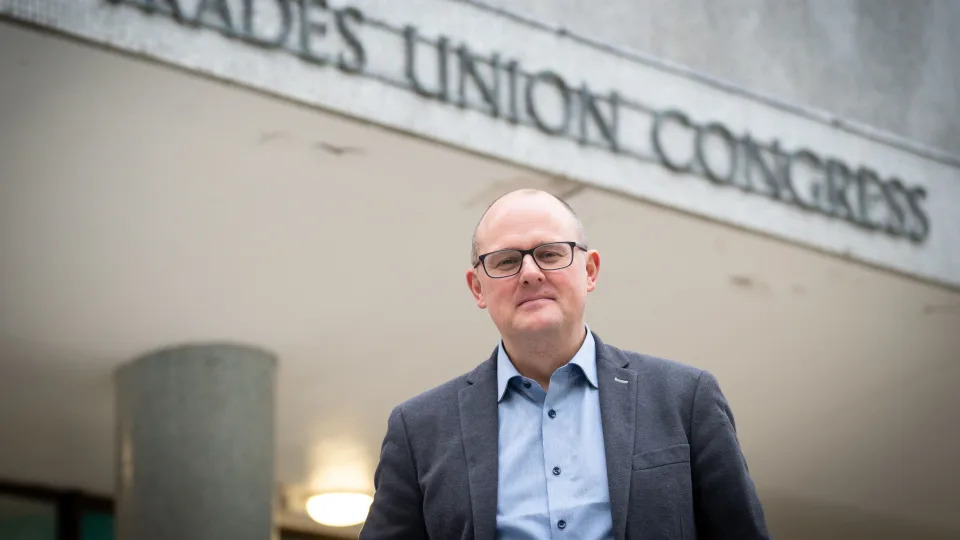
The entire trade union movement will rally behind any worker who is sacked under a controversial new law on strikes, the head of the TUC is warning.
New regulations are aimed at ensuring a minimum level of services during strikes, starting in sectors including the railways and the Border Force before being more widely introduced.
The Government brought forward the new law following 18 months of strikes by hundreds of thousands of workers including nurses, teachers, junior doctors, civil servants and train drivers.
Unions have vowed to fight the law, under which workers could face being sacked if minimum levels of service are not maintained.
TUC general secretary Paul Nowak said: ”Nobody withdraws their labour lightly. It is the last resort when employers refuse to talk and refuse to compromise.
“The action taken by union members in 2023 forced bosses across the country back to the negotiating table and secured better deals.
“Unions will do everything in our power to defend that right to strike. It is a cornerstone of our democracy.
“We won’t be intimidated by this Government, and we won’t be bullied.
“The Tories’ Strikes Act is toxic, unworkable, undemocratic and likely illegal and it’s a brazen attempt to try stop working people winning better pay and conditions.
“The entire trade union movement will rally behind any worker who is sacked for exercising their right to strike.”
The Royal College of Nursing said it “totally opposed” the new law.
General secretary Pat Cullen said nursing staff could be forced to work during an otherwise legal strike or face the sack.
She told the PA news agency: “The Strikes Act is dangerous and unwise. Ministers are seeking to silence nursing staff, stopping them from speaking out over patient safety concerns, or protesting poor pay and working conditions.
“The legislation means that nursing staff could be conscripted to work, or face the sack during legal industrial action.
“Nursing staff will be appalled that ministers are seeking to curtail their freedom to speak out as we go into a general election year.”
Angela Rayner, Labour’s deputy leader and shadow deputy prime minister, said: “This Government’s failed approach has led to the worst strikes in decades causing havoc for working people this Christmas.
“Rishi Sunak’s ‘sacking nurses Bill’ is nothing but another sticking plaster to distract from the Conservatives’ 13 years of failure. We all want minimum standards of service and staffing, but it’s Tory ministers who are consistently failing to provide them.
“Only Labour can offer the change Britain needs, with industrial relations fit for a modern economy, where issues can be resolved before they escalate.”
A Government spokesperson said: “The Government believes that the ability to strike is important, but this needs to be balanced with the rights of the public to access essential public services, such as ambulances and rail, when they need them.
“We expect trade unions to comply with the law and play their part in delivering minimum service levels.”
Norway’s biggest pension fund boycotts Gulf companies over Middle East fears
Michael Bow
Thu, 28 December 2023

UAE
Norway’s largest pension fund will boycott 12 companies in the Gulf region over alleged human rights abuses, including creeping state surveillance and poor treatment of migrant workers.
KLP, which manages $100bn (£78bn) of assets and owns stakes in UK companies, said it will stop investing in the firms over fears it will fuel problems in the Middle East.
Eleven of the 12 are telecom or construction companies based in the United Arab Emirates (UAE), Kuwait, Qatar and Saudi Arabia.
The world’s largest oil company Saudi Aramco, which is 90pc owned by the Saudi state, is on the list over fears authorities exert too much control over the business.
KLP said investments in these firms posed “an unacceptable, sector-specific risk of contributing to human rights abuses”.
The telecom sector was targeted because KLP said it allowed governments to spy on their citizens.
The construction sector was also a risk due to the treatment of migrant workers, which was a widespread issue in the build-up to the 2022 World Cup in Qatar.
Among those blacklisted include Emirates Telecom Group, Emaar Properties and Aldar Properties in the UAE, Mobile Telecommunications and Mabanee in Kuwait and Barwa Real Estate and Ooredoo in Qatar.
Ties will also be cut with Saidi Arabia’s Aramco, Saudi Telecom, Etihad Etisalat, Dar Al Arkan Real Estate and Mobile Telecommunications.
Kiran Aziz, head of responsible investments at KLP, said the fund had published its assessment to prompt debate about human rights.
Ms Aziz said the difference between its approach and the policy of some UK investment funds was “how reluctant people are in terms of talking about this publicly”.
She said the fund had spent four years researching the issue and met with the Saudi stock exchange and several companies before publishing its decision.
Ms Aziz said: “We could have just put these companies on the list without giving an assessment but you would lose the value of what we’re trying to achieve. We want to debate our exclusions and we want the companies to understand where we draw the line and other stakeholders as well.
“There are a lot of good companies in Gulf states and we have seen it has had quite good development on corporate governance but at the same time, with migrant workers and breach of labour rights, it’s such a core issue for this region that it’s difficult to justify it from our point of view.”
Only one of the companies blacklisted, which is based in the telecom sector, had raised concerns with KLP, Ms Aziz said.
UK
Bad bosses blamed for dragging down economy
Szu Ping Chan
Thu, 28 December 2023

london commuters
Bad middle managers are dragging down the economy, according to a string of blue-chip bosses and analysts, who say inept executives are at the heart of Britain’s productivity problem.
FTSE 100 insurer Phoenix has identified poor middle management as one of the biggest drags on their business, while economists at the Resolution Foundation warned that Britain’s army of bad managers “stands out” globally.
It is understood that the company behind Standard Life conducts an informal exercise every year where parts of its businesses examine whether they can produce the same amount of output with a 3pc reduction in resources.
Another executive at a UK-listed firm said: “Most of the weakness is down to bad middle management. Some of them leave every year and it’s hardly noticed.”
UK pay growth has stagnated since the financial crisis amid a collapse in productivity that threatens to push the UK into a low-growth trap.
Recent research by the Chartered Management Institute branded four-fifths of British supervisors “accidental managers” because they have no formal training after being promoted.
A third of the 2,000 people surveyed also said they had left jobs because of a negative working culture.
The Resolution Foundation recently warned that firms were not as well managed in the UK as the US, with dire consequences for investment, productivity and growth.
“Rising interest rates are biting across borders, and bad taxes are found in many countries. Bad managers are, however, an area in which Britain stands out,” it said in a flagship report.
“Only a small proportion of UK firms are as well managed as the best 25pc of US firms.”
It added: “This matters for reasons beyond investment. But well-managed firms make better investment decisions, being demonstrably better at forecasting the growth of the aggregate economy and of their own firm.”
The collapse in UK productivity means that workers in the US produced 28pc more per hour than in the UK in 2019.
Economist John van Reenen added that French and Germans are also around 13pc more productive than their British counterparts.
An index on management practices compiled by respected economists, including Mr van Reenen at Stanford and the London School of Economics, has suggested that more than 50pc of the productivity gap between Britain and America can be explained by poor management.
A spokesman for Phoenix said: “We always look to operate efficiently and effectively, and to have the highest calibre of leaders at every level which we know is important to colleagues.
“Moving colleagues between different areas of our business can be really helpful to our organisation in terms of building expertise and inspiring others.
“It provides us with an opportunity to bring fresh thinking, maximise productivity and always ensure our resources, including middle management, are aligned in the best possible way. This is important to UK corporate productivity.”
The Resolution Foundation believes Britain’s fragmented investment landscape has led to a more cautious corporate culture, where a majority of overseas shareholders are often dispersed and lack engagement in the company’s fortunes because their shares are so small.
This is in contrast to many other European countries, where controlling shareholders are common.
“The ownership of UK-listed firms has become more remote – with foreign ownership of UK public firms rising from just over 10pc in 1990 to over 55pc in 2020 – and extremely dispersed,” the Foundation said.
“The UK stands out in the OECD for having one of the lowest proportion of firms with ‘blockholder’ shareholders, big enough to have an incentive and the ability to influence firm decisions.”
While the Foundation believes worker representation on boards will benefit the economy, others have warned the approach favoured by Left-wing politicians including Jeremy Corbyn, the former Labour leader, could make the productivity problem worse by forcing companies to protect jobs instead of making tough decisions.
UK
More misery for commuters as rail operators brace for budget cutsTORY AUSTERITY
Matt Oliver
Thu, 28 December 2023

Ticket revenues are £4bn below pre-pandemic levels - Yui Mok/PA Wire
Millions of rail passengers face fresh misery in 2024 after train companies were told to find savings that could lead to reduced services and more overcrowding.
The Government, which nationalised rail franchises during the Covid pandemic, has ordered providers to slash their costs from April.
According to industry sources, the scale of the savings being sought is as much as £2bn to £3bn per year, with companies being asked to put forward initial suggestions within weeks.
Whitehall insiders suggested the request was part of the routine budgeting process and that subsidies for the rail industry remained high compared to pre-pandemic levels, after increased working from home hit demand.
But on Thursday, experts said the cuts, first reported by the Financial Times, would result in worse services, deterring passengers just as greater demand appeared to be returning.
They warned the scale of the savings being asked for would almost certainly force train operators to run services with fewer carriages or less frequently, raising the risk of busier trains and more overcrowding.
William Barter, an independent rail consultant with expertise in operations and planning, said there were anecdotal signs passenger growth had recovered further in the most recent quarter as more employers asked staff to work in offices for at least three days per week.
But he added: “The problem with cuts like this is that railways have very high levels of fixed costs - such as rolling stock - and very low levels of variable costs, so to make any significant savings you have to take out a lot of variable costs.
“That means quality of service goes down, which depresses passenger growth and revenues.
“If you really want to reduce the amount of subsidies being paid, the best way to do that would actually be to find ways to increase revenues - we should be going all-out to get people back on the trains.
“But if more people are having to stand for long-distance journeys, you are just going to achieve the complete opposite.”
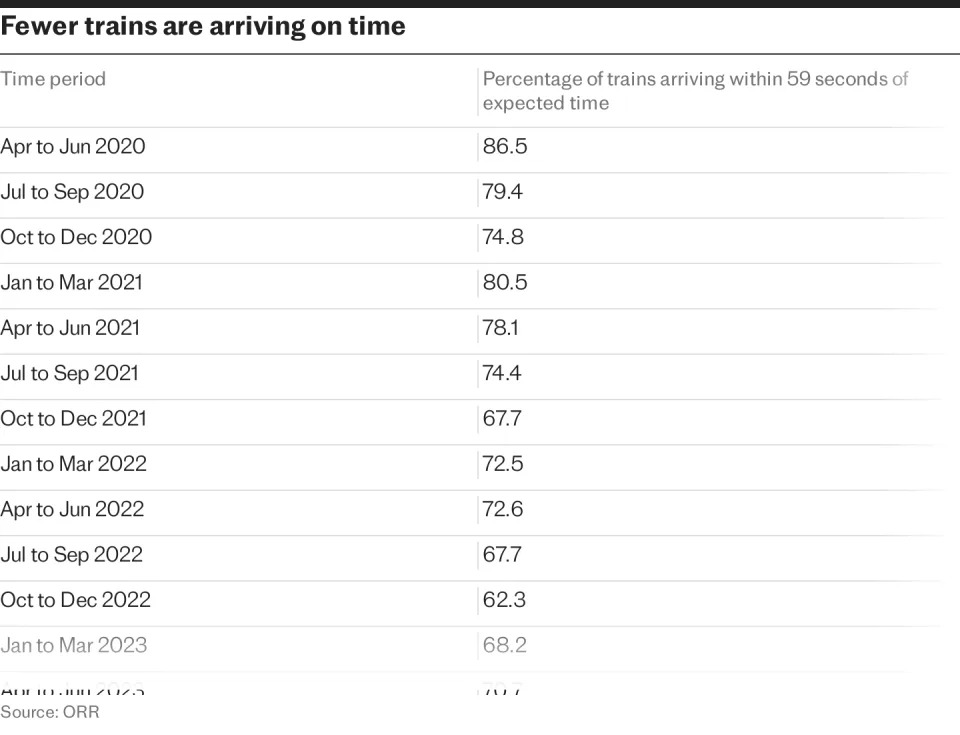
Christian Wolmar, a railway historian and host of the Calling All Stations podcast, said: “I have spoken to people in government who say you absolutely can’t make these cuts without there being some kind of reduction in services, and some the ones already imposed have eaten into timetables to some extent.
“You have got places where you now have half-hourly trains instead of services every 20 minutes and others where they have cut back on carriages. So there is going to be a severe impact from this.”
He claimed the need for fresh savings had grown after ministers were forced to backtrack on proposals to close nearly 1,000 ticket offices following a public outcry.
However, a Whitehall insider noted that subsidies for the rail industry had jumped enormously since the pandemic, when lockdowns and remote working hit demand for travel and the Government stepped in to prop up train providers.
Only £9.2bn of ticket revenues were collected in the 2022/23 financial year, more than £4bn below pre-pandemic levels. Over the same period, subsidy levels jumped from £5.1bn to £11.9bn.
It comes amid widespread concern that services are getting worse, with figures showing roughly one in seven rail passengers could expect to stand when travelling between cities in England and Wales last year.
Delays are also common. In the three months to the end of September 2023, two fifths of train departures were late, according to the Office of Rail and Road.
Meanwhile plans to reform the way the railways have been stuck in the sidings since May 2021, when a review recommended the creation of ‘Great British Railways’, a quango that would be responsible for managing tracks and trains.
Those proposals have been delayed under Rishi Sunak, the Prime Minister, as well as plans to create a government-backed ticketing system and smartphone app to simplify fares for passengers.
On Thursday, the Department for Transport insisted that more budget cuts should not lead to worse services.
A spokesman said: “We have been upfront about the need to reform our railways in order to make them financially sustainable, and we expect operators to maintain services while ensuring passengers are provided better services at no additional cost to the taxpayer.”
Last week, ministers announced rail fares would rise by 4.9pc next year. That is below the normal 9pc increase that would have taken place, had the rise been index-linked to inflation
UKPost Office breaks daily cash withdrawal record amid cost of living crisis
Mark Sweney
Thu, 28 December 2023

Photograph: Lucy Ray/PA
More than £62m in cash was withdrawn from Post Office branches on the Friday before Christmas, the most ever in a single day, as people rushed to finish their festive shopping.
The record withdrawals on 22 December from the 11,500 Post Office branches across the UK beat the previous record of just over £51m, set on the final Friday before Christmas last year.
The record also reflects the sharp increase in the cost of living over the past two years as the rate of inflation hit a 41-year high of 11.1% late last year, although it has since eased to 3.9% in November, the lowest rate of increase in two years.
“For some people, being able to withdraw cash for free helped them to finish last-minute shopping for the big day, for others it may have been a last-minute gift,” said Ross Borkett, head of banking at the Post Office.”
Cash payments have made a wider comeback during the cost of living crisis, as people turn to “tangible” physical money to help them manage their budgets. In 2022, cash payments increased for the first time in a decade, rising by 7% to reach 6.4bn payments according to the banking body UK Finance.
On Christmas Day this year, when about 1,500 Post Office branches mostly located in convenience stores were open, personal customers withdrew £800,000.
However, it was also a day that recorded a significant number of consumers aiming to bank their Christmas gifts of cash and cheques, with £1.1m in personal deposits made. Business customers also deposited £1.06m through Post Office branches on Christmas Day.
“Millions of people rely on being able to access cash every day at their local Post Office and it is no different on Christmas Day,” said Borkett.
“Business cash deposits being made on Christmas Day indicate just how vital it is that pub and restaurant owners have somewhere open and convenient to deposit their much-needed Christmas cash takings ahead of a quieter January.”
Cash withdrawals hit all-time high on last Friday before Christmas – Post Office
Anna Wise, PA Business Reporter
Thu, 28 December 2023
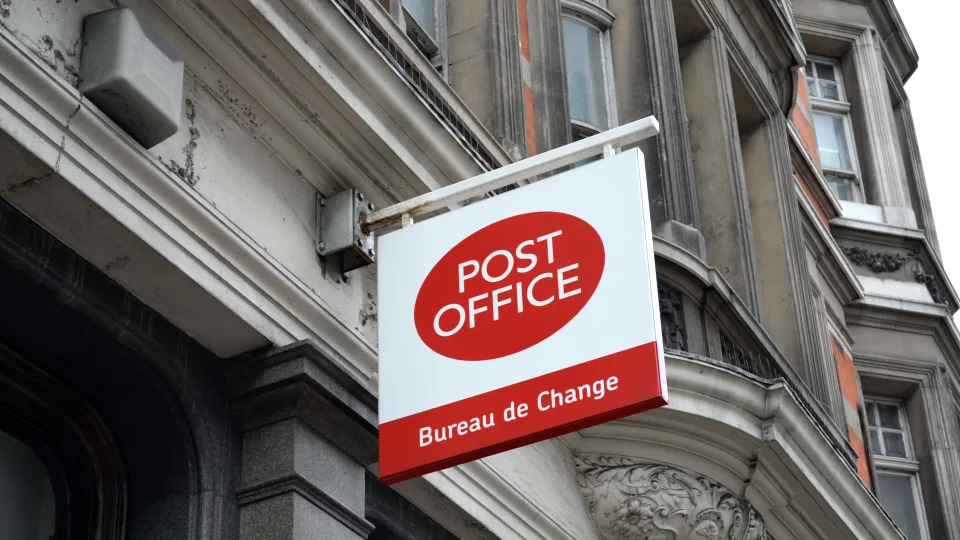
The amount of cash withdrawn at Post Offices hit an all-time high on the last Friday before Christmas as people sourced last-minute gifts, the group has revealed.
More than £62 million was withdrawn by personal customers on Friday December 22, the highest amount ever taken out on a single day.
The total beats the previous record by more than £10 million, when £51.5 million was taken out over the counter on Friday December 23 2022.
Some £800,000 was withdrawn on Christmas Day itself, the Post Office revealed.
Furthermore, about £1.1 million was deposited by personal customers and the same amount by business customers over the counter.
Ross Borkett, the Post Office’s head of banking, said: “For some people, being able to withdraw cash for free helped them to finish last-minute shopping for the big day, for others it may have been a last-minute gift.
“Business cash deposits being made on Christmas Day indicate just how vital it is that pub and restaurant owners have somewhere open and convenient to deposit their much-needed Christmas cash takings ahead of a quieter January.”
ATM network Link also said the last Friday before Christmas had been the busiest day of the year for cash withdrawals, and the biggest total since the start of the Covid-19 pandemic.
Around £460 million was withdrawn on December 22, on what was the last working day before Christmas for many people, ahead of a four-day break.
The average value of a withdrawal on that day was just under £105, according to Link.
Link chief executive John Howells said: “We generally see higher withdrawals ahead of bank holidays and the end of the month, but ATM use is changing.
“Pre-pandemic, people would typically visit ATMs around twice a week and take out around £65. Post-Covid, with more people comfortable using contactless payments, people tend to visit once and take out more, on average £85.
“Over the past few years, our research shows cash use is highest at convenience stores, supermarkets but also paying family and friends.”
The Post Office has previously stressed that businesses, particularly in the leisure and hospitality sector, rely on its branches to deposit cash, especially in communities where bank branches have been shut down.
It has also suggested that the rising cost of living has led people to increasingly turn to cash to manage their budgets on a weekly basis and often day by day.
Simon Trevethick, head of communications at StepChange Debt Charity, said: “Christmas is always a difficult time for people in financial difficulty, but this year more than most, given the past two years of rampant inflation and rising interest rates, millions of households are feeling the squeeze.
“Our research earlier this month found that one in four people said they would struggle to afford Christmas this year, rising to more than one in three households with children.”
Cat Farrow, chief operating officer at Cash Access UK, said: “Although more people are making digital and contactless payments, cash is still important to millions of people to help manage their money, and it’s still a popular way of giving gifts to family members.”
UK
Nurses’ strikes won only ‘modest progress’ on pay and conditions, says leader
Alan Jones, PA Industrial Correspondent
Wed, 27 December 2023
Strikes by nurses this year only led to modest progress in pay and staffing in the NHS, according to a union leader.
Pat Cullen, general secretary of the Royal College of Nursing (RCN), said politicians did enough to “save their own skins, not the revolution needed”.
In a new year message to half a million RCN members, Ms Cullen broadened the union’s campaign for 2024 to include seeking commitments on safe staffing levels as well as a fair pay rise for nursing.
She urged RCN members to “again push ministers further than they want to go”.
There are currently more than 40,000 nursing vacancies in England’s NHS and nursing staff routinely care for 10-15 patients, which the RCN warns is unsafe.
Ms Cullen said the nursing year started with an unprecedented amount of anger as well as optimism.
“We were on picket lines across the country either side of last Christmas and we’d never been louder as a profession – pushed there because nobody was listening but very firmly believing something positive would come out of it all.
“Politicians only granted us modest progress – enough to save their own skins but not the revolution that nursing needs and patients deserve.
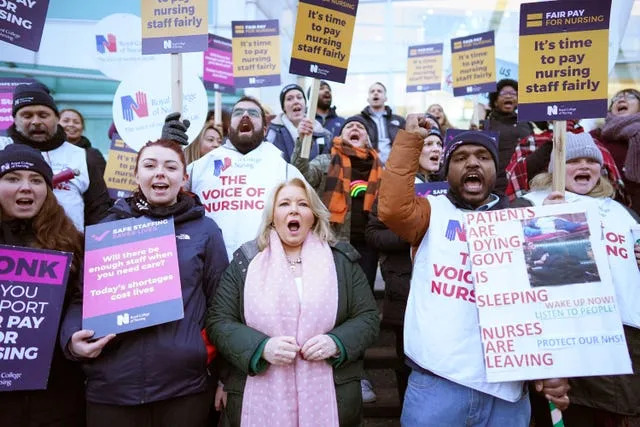
Pat Cullen joined RCN members on the picket line outside University College Hospital, London, this year (Stefan Rousseau/PA)
“Would we do it over again? Yes, by your actions you forced ministers to announce a top-up on the previous year’s pay settlement and give more than they had wanted to for the current year.
“Me and other RCN negotiators got every penny they were ever going to give – and that was real money in your banks when it’s really been needed most – but their desire to fix nursing was simply not as strong as ours.
“What’s your appetite to campaign for more? Not just a pay rise but a big commitment to improve staffing levels and patient safety.
“2024 is a general election year and every party will be challenged by the RCN to demonstrate clear vision and hard cash for nursing, the NHS and social care. Let’s make sure we again push ministers further than they want to go.”
Reacting to new regulations expected to be laid in Parliament in January relating to strikes by hospital workers, the RCN leader added: “Despite promises earlier this year that the new Strikes (Minimum Service Levels) Act would not target nursing staff, we’re now faced with proposals for hospital workers that could see them forced to work during strikes or face the sack.”
Unions have pledged to campaign against the controversial new law, which was brought in after an unprecedented 18 months of strikes by hundreds of thousands of workers.
A Department of Health and Social Care spokesperson said: “We hugely value the hard work of NHS nurses, which is why we provided a 5% pay rise and two significant one-off awards – worth over £2,000 on average for full-time nurses.
“This deal, which the RCN recommended its members accept, also included a number of commitments to deliver a series of reforms to improve working conditions.
“We have recruited more than 50,000 extra nurses compared to 2019 – hitting our target early – and the Long Term Workforce plan will ensure the NHS has the staff it needs over the next 15 years so patients continue to receive the best possible care.”
India and France to fete 25 years of military ties with Macron visit
Pratap Chakravarty
Thu, December 28, 2023

French President Emmanuel Macron will preside over India’s Republic Day celebrations next month to cap the 25th anniversary of strategic military ties worth billions of euros for France's arms industry.
Delhi's invitation to the French president came after US leader Joe Biden declined an offer to be the guest of honour at the 26 January parade.
Macron will become the sixth French leader to attend the annual military extravaganza since 1976.
Indian Prime Minister Narendra Modi is returning the honour after Macron invited him to attend France’s traditional military parade on Bastille Day on 14 July.
“As strategic partners, India and France share a high degree of convergence on a range of regional and global issues,” India’s External Affairs Ministry said.
It will be the second meeting between Macron and Modi since September, when the two leaders promised to take India-France relations to new heights during talks on the sidelines of the G20 summit in Delhi.
Delhi G20 summit ends with mixed success
France is India’s closest strategic partner in Europe and its second-largest arms supplier after Russia, having edged past the US last year.
France now supplies 29 percent of India’s military hardware imports, and is hoping for more.
In Moscow to meet Putin and Lavrov, India's foreign minister praises growing trade
Wed, December 27, 2023
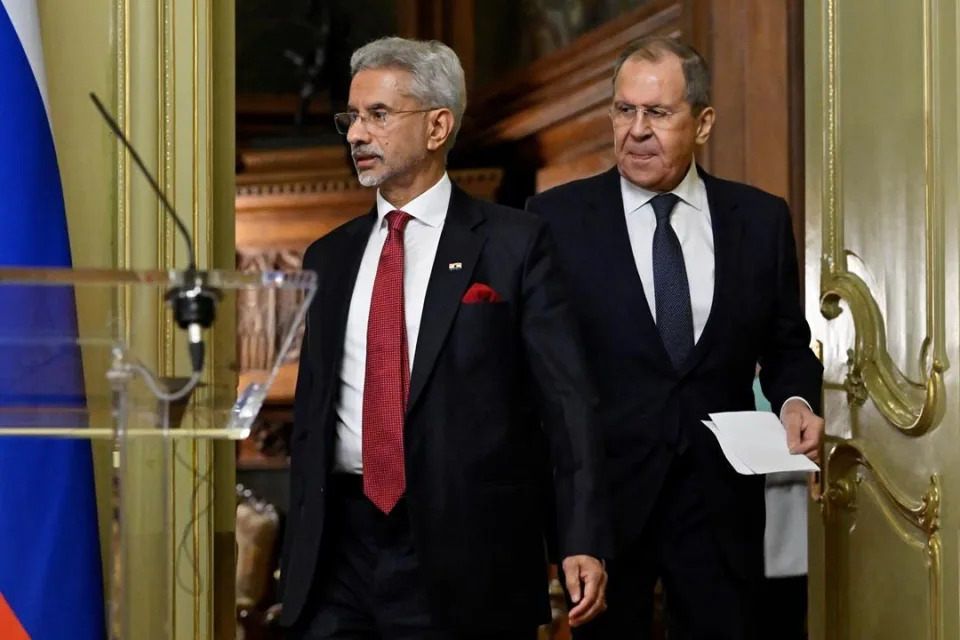
MOSCOW (AP) — India's foreign minister met Wednesday with Russian President Vladimir Putin, who said relations between the countries are progressing even amid turbulent times.
Subrahmanyam Jaishankar's meeting was part of a five-day visit. At the start of the meeting, Putin said he would inform the Indian diplomat about the fighting in Ukraine, on which Indian Prime Minister Narendra Modi has held a neutral stance.
"I know about his desire to do everything to resolve this problem through peaceful means,” Putin said.
India is increasingly important to Russia as a market for oil exports, the backbone of its economy, as Western sanctions curtail oil shipments.
“It is very important to make our trade interaction more sustainable. We need to think about how to achieve this,” Jaishankar said, according to a Kremlin transcript of the meeting's opening.
Jaishankar also met with Russian counterpart Sergey Lavrov, who said they discussed “the prospects for military-technical cooperation, including the joint production of modern types of weapons.”
India’s foreign minister praised the “all-time high” trade turnover between the two countries, which he said exceeded $50 billion in 2022.
“We expect to exceed that this year. And what is important is that this trade is more balanced, it is sustainable, and it provides for fair market access,” he said.
The Associated Press
Russia, India closer to joint military equipment production - minister
Reuters
Wed, December 27, 2023 at 5:15 a.m. MST·1 min read
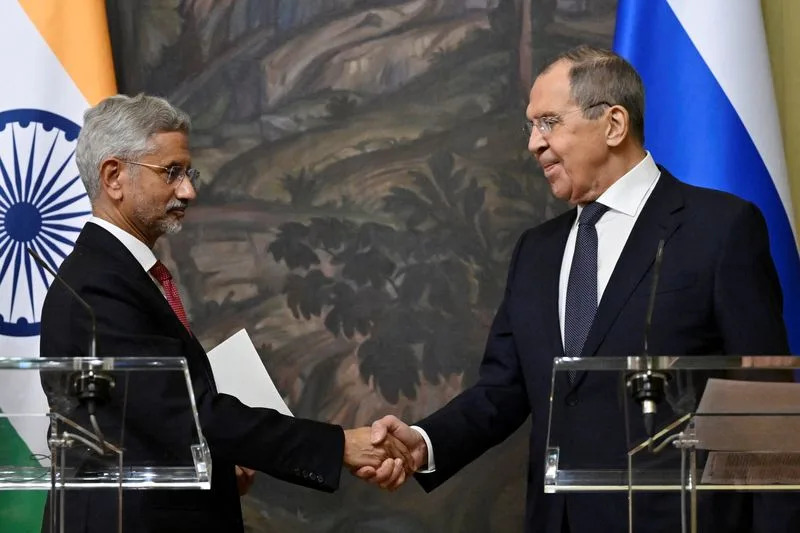
Russia's Foreign Minister Sergei Lavrov meets India's Foreign Minister Subrahmanyam Jaishankar in Moscow
MOSCOW (Reuters) - Russia and India have made tangible progress in talks on plans to jointly produce military equipment, Russian Foreign Minister Sergei Lavrov said on Wednesday, after talks with his Indian counterpart Subrahmanyam Jaishankar in Moscow.
Speaking at a news conference, Lavrov said such cooperation was of a strategic nature and was in both countries' interests and would help ensure security on the Eurasian continent.
He said Moscow respected India's desire to diversify its military hardware suppliers and was ready too to support New Delhi's desire to manufacture things needed by India in India.
Kremlin spokesman Dmitry Peskov said Russian President Vladimir Putin would meet Jaishankar later on Wednesday.
Jaishankar said he expected Putin and Indian Prime Minister Narendra Modi to meet next year.
Jaishankar said he and Lavrov had discussed the conflicts in Ukraine and Gaza, as well as bilateral trade and investment.
India has become one of Russia's core economic partners since the West in 2022 imposed sweeping sanctions on Moscow over the war in Ukraine.
Russia has diverted much of its oil exports to India and stepped up diplomacy within the BRICS group of nations, a grouping of which both countries are founding members.
According to Jaishankar, Indian-Russian trade is expected to top $50 billion this year.
He said New Delhi was keen to sign a bilateral investment treaty with Russia as well as a free trade agreement with the Moscow-led Eurasian Economic Union.
(Reporting by Reuters; Writing by Olzhas Auyezov; Editing by Andrew Osborn)
Independent lawyers begin prosecuting cases of sexual assault and other crimes in the US military
LOLITA C. BALDOR
Updated Thu, December 28, 2023
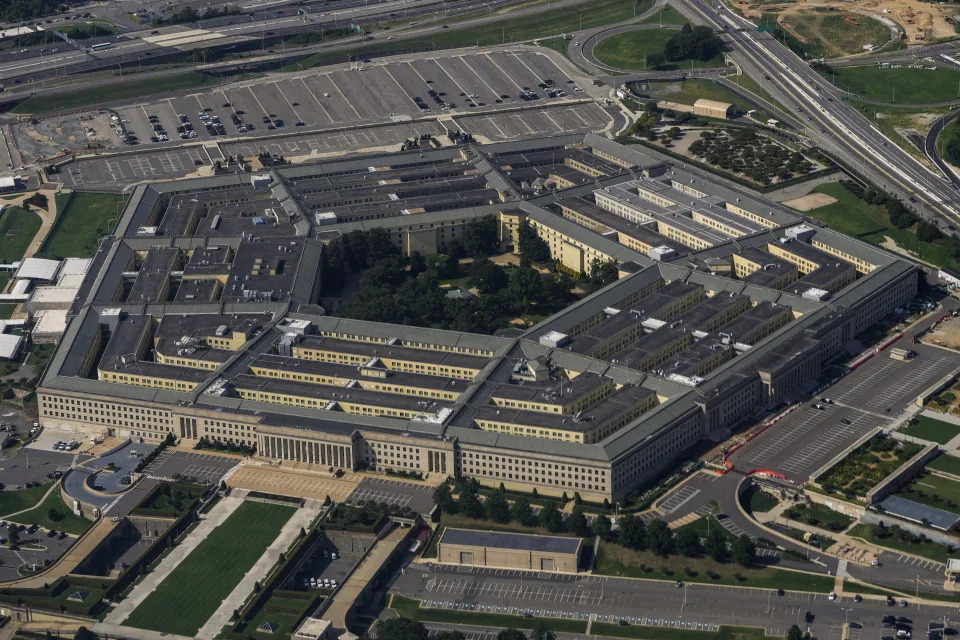
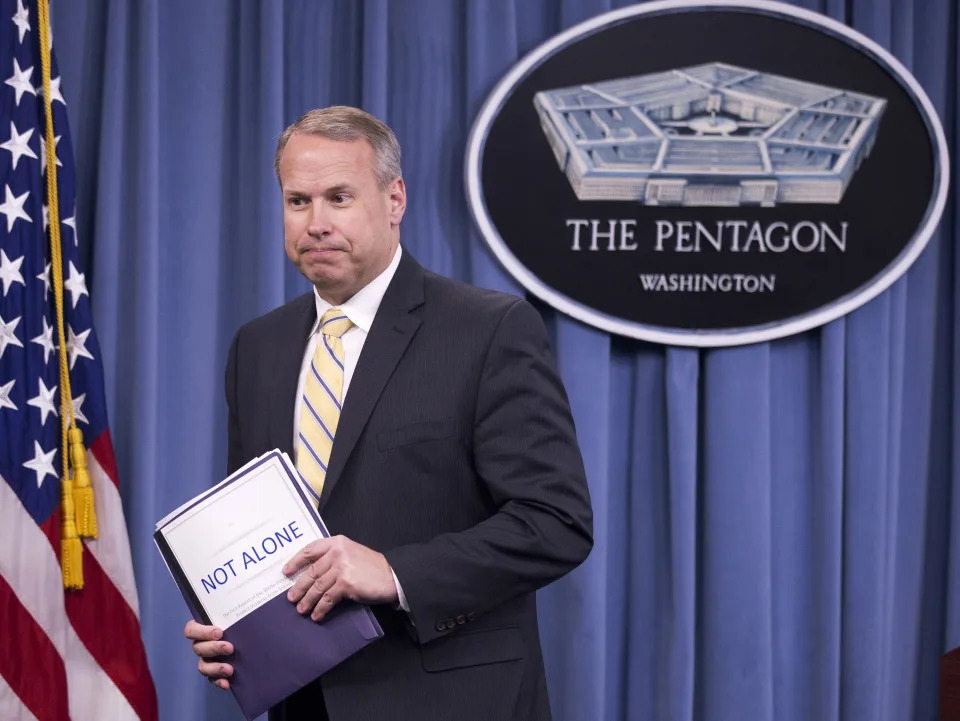
Nate Galbreath, Senior Executive Adviser for the Department of Defense Sexual Assault Prevention and Response Office (SAPRO), leaves a news conference at the Pentagon. Galbreath, acting director of the Pentagon’s sexual assault prevention and response office, said in April the department was using a budget infusion of $479 million this year to hire as many as 2,400 personnel for a new “prevention workforce.” (AP Photo/Manuel Balce Ceneta, File)
WASHINGTON (AP) — The U.S. military on Thursday opened a new chapter in how it investigates and prosecutes cases of sexual assault and other major crimes, putting independent lawyers in charge of those decisions and sidelining commanders after years of pressure from Congress.
The change, long resisted by Pentagon leaders, was finally forced by frustrated members of Congress who believed that too often commanders would fail to take victims' complaints seriously or would try to protect alleged perpetrators in their units.
The new law was fueled by a persistent increase in sexual assaults and harassment across the military. The Air Force, the Marine Corps and the Navy all saw reported sexual assaults go up last year, but a sharp 9% drop in reports from the Army — the largest military service — drove the overall number down. In 2021, reported assaults spiked by 13%.
Under the law, new special counsels will have the authority to make prosecution decisions on a number of major crimes, including murder, rape and several other sexual assault-related offenses, kidnapping, domestic violence, making or possessing child sexual abuse images, stalking and retaliation.
In a statement, Secretary of Defense Lloyd J. Austin III called it “the most important reform to our military justice system since the creation of the Uniform Code of Military Justice in 1950.”
It's unclear, however, what impact the change will have on the broader problem of sexual misconduct in the military, including if it will trigger an increase in prosecutions and, if so, whether that will have any deterrent effect.
Senior officials from the military services who are familiar with the new program said they already have more than 160 certified special trial counsels who will take over the prosecution decisions as of Thursday. Many of those lawyers, however, have already been involved, providing advice and support for months on cases that are underway. The officials spoke to reporters on the condition of anonymity to discuss the new program under rules set by the Defense Department.
As of Thursday, the special trial counsels will have sole authority to make prosecution decisions on new cases involving the major crimes. Any advice on already existing cases is nonbinding, the officials said.
According to the officials, the Army will have 65 certified trial counsels, the Air Force will have 40, the Marine Corps will have 33 and the Navy will have 24, with 23 attorneys who are not yet certified assisting in the cases. About 10 more are expected to be certified in the summer.
The lawyers will be scattered around the U.S. and the world, with larger numbers at bases and locations where there are more service members and more crime.
The officials said they expect each trial counsel to handle as many as 50 investigations and roughly eight to 12 trials a year.
An independent commission that studied sexual assaults in the military suggested in its report that the use of special counsels would have a positive impact. It said the special counsels would make better decisions on what cases should go forward, resulting in higher conviction rates. Increased convictions, the report said, will encourage more accused perpetrators to make plea agreements, which alleviates the need for victims to testify at trials.
“These outcomes will also increase confidence in the public that the military is correcting its course in the prosecution of special victim cases,” the report said.
Sean Timmons, managing partner at the Tully Rinckey law firm, which specializes in military cases, said the change doesn't really get at the underlying behavioral problems. As a result, he said, it is unlikely to have any real impact or deterrent effect on misconduct by service members. He said that it could result in more people being fired as a result of board proceedings but that in agreements in which the victims don't testify, the cases may end up being weaker.
“My analogy of that is we’re rearranging the chairs on the Titanic,” said Timmons, a former Army judge advocate general. “Nothing will really change other than semantics and appearances. That's the unfortunate reality.”
The military services have long struggled to come up with programs to prevent sexual assaults and to encourage reporting, including a number of new initiatives in recent years. But they have yet to show any real progress in lowering the number of reported assaults, and anonymous surveys still indicate that many more victims opt not to report.
Defense officials have long argued that an increase in reported assaults is a positive trend, both in the military and in society as a whole. Greater reporting, they say, shows there is more confidence in the reporting system and the support available for victims.
Nate Galbreath, acting director of the Pentagon’s sexual assault prevention and response office, said in April the department was using a budget infusion of $479 million this year to hire as many as 2,400 personnel for a new prevention workforce. He said about 350 had already been hired and as the number grew they would be placed in military installations around the world to help commanders address some of the risk factors that lead to sexual assault.
Russia abducts 10,000 Ukrainian children to Russian ‘health’ camps in Autumn 2023 alone
The New Voice of Ukraine
Thu, December 28, 2023

Children
Nearly 10,000 Ukrainian children were abducted to Russia from Ukraine’s temporarily occupied territories for so-called “health improvement” in the fall of 2023 alone, the National Resistance Center (NRC) reported.
Children are subjected to propaganda in these camps and Russian authorities often refuse to return them to their legal guardians.
Russians had set a target to transport 2,500 children from each occupied region, the NRC said.
Read also: UA identifies Russian General responsible for torture, beatings, and kidnap of Ukrainians in Lyman
Doctors brought in from Russia issue medical certificates for such “health improvement.”
A notable incident involved the death of a child on the Tyumen-Adler train, who was returning from one such “health improvement” program, reported Luhansk regional governor Artem Lysohor on Dec. 21.
Read also: Over 380 children abducted by Russia have now been returned, says deputy PM
All children were transported under terrible conditions and were vaccinated with a Russian flu vaccine, leading to the hospitalization of over 100 children, the NRC said.
The International Criminal Court issued arrest warrants on March 17 for Russian dictator Vladimir Putin and Russian “Children’s Rights” Commissioner Maria Lvova-Belova for their involvement in the unlawful transportation of children from Ukraine to Russia.
The Parliamentary Assembly of the Council of Europe (PACE) adopted a resolution on April 27 to recognize the forced transfer of Ukrainian children to Russia as genocide.
As of Sept. 27, at least 19,546 children have been deported or forcibly displaced by Russia, reported the Ukrainian state platform Children of War.
According to the European Parliament, the number of Ukrainian children illegally taken to Russia could be as many as 300,000. MEPs believe that Russians began taking Ukrainian children back in 2014, after the occupation of Crimea and parts of Donetsk and Luhansk oblasts.
Earlier, Lvova-Belova said that since the beginning of the full-scale invasion of Ukraine, the occupation forces had illegally transferred more than 700,000 Ukrainian children to Russian territory.
More Ukrainian children from Ukraine's Russia-held regions arrive in Belarus despite global outrage
YURAS KARMANAU
Thu, December 28, 2023
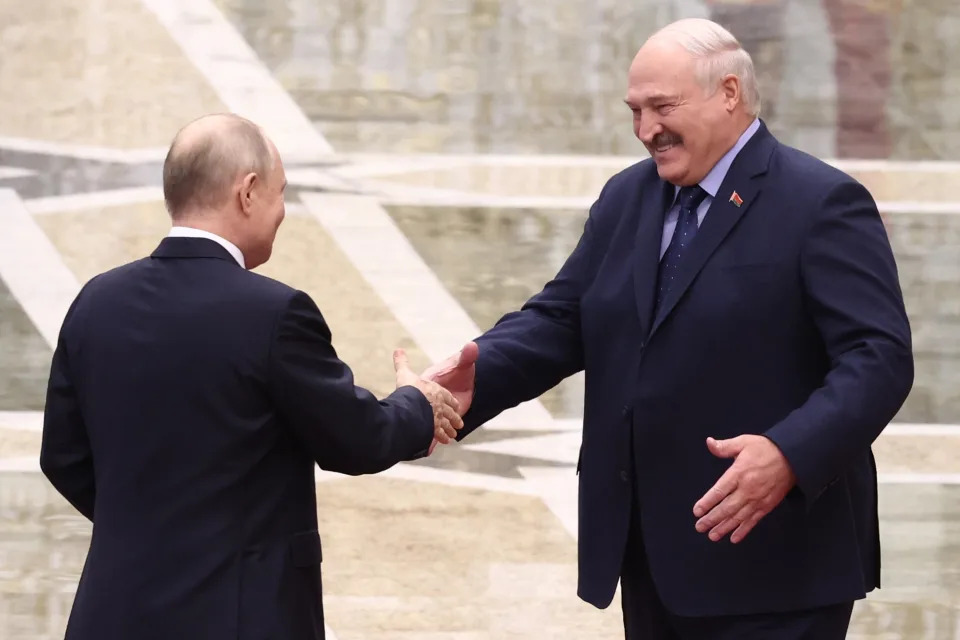
FILE - Belarus' President Alexander Lukashenko, right, and Russian President Vladimir Putin greet each other prior to a session of the Collective Security Treaty Organisation (CSTO) in Minsk, Belarus, on Nov. 23, 2023. The International Red Cross on Friday Dec. 1, 2023 suspended the Belarusian chapter after its head stirred international outrage for boasting that it was actively ferrying Ukrainian children from Russian-controlled areas to Belarus. (Valery Sharifulin, Sputnik, Kremlin Pool Photo via AP, File)More
TALLINN, Estonia (AP) — Belarus' authoritarian president on Thursday attended a government-organized meeting with children brought from Russia-controlled areas of Ukraine, openly defying an international outrage over his country's involvement in Moscow's deportation of Ukrainian children.
Speaking at the event marking the arrival of a new group of Ukrainian children ahead of the New Year holiday, President Alexander Lukashenko vowed to “embrace these children, bring them to our home, keep them warm and make their childhood happier."
Belarusian officials did not say how many Ukrainian children were brought into the country.
A recent study by Yale University has found that more than 2,400 Ukrainian children aged 6-17 have been brought to Belarus from four Ukrainian regions that have been partially occupied by Russian forces. The Belarusian opposition has urged the International Criminal Court to hold Lukashenko and his officials accountable for their involvement in the illegal transfer of Ukrainian children.
Pavel Latushka, a former Belarusian culture minister turned opposition activist who has presented the ICC with evidence of Lukashenko's alleged involvement in the unlawful deportation of the children, said the arrival of a new group from Russia-occupied territories “underlines the need for the ICC to investigate those crimes.”
“Lukashenko, his family members and associates together with the Kremlin have organized a system of transfer of Ukrainian children, including orphans, from the occupied territories to Belarus, and this channel is still working,” Latushka told The Associated Press.
In March, the ICC issued arrest warrants for both Russian President Vladimir Putin and his children's rights commissioner, Maria Lvova-Belova, accusing them of the war crimes of unlawful deportation of children and unlawful transfer of children from occupied areas of Ukraine to Russia. Moscow has rejected the allegations.
Ukraine's human rights ombudsman Dmytro Lubinets said in televised remarks Thursday that the transfer of thousands of Ukrainian children to Belarus helped Moscow cover up the information about the unlawful deportation of children.
Earlier this month, the International Red Cross suspended the organization's Belarusian chapter after its chief, Dzmitry Shautsou, stirred international outrage for boasting that it was actively ferrying Ukrainian children from Russian-controlled areas to Belarus.
Shautsou called the move “absolutely politicized," claiming that Ukrainian children who visited Belarus for “health improvement” returned home safely.
Belarus has been Moscow’s closest ally since the Russian invasion of Ukraine began in February 2022, when Lukashenko allowed the Kremlin to use his country's territory to invade Ukraine. Russia has also deployed some of its tactical nuclear weapons in Belarus.















